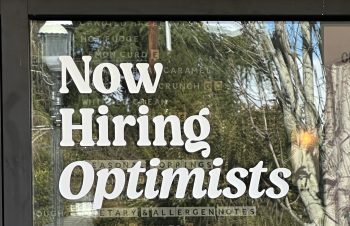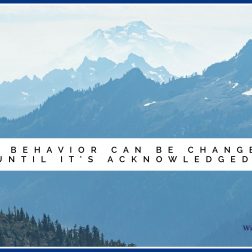 While on a walk a few weeks ago I noticed this sign in a shop window, and it sparked an important insight I want to share with you. When hiring, a person’s level of Contentment is frequently underestimated but make no mistake, it is a very important behavior to measure.
While on a walk a few weeks ago I noticed this sign in a shop window, and it sparked an important insight I want to share with you. When hiring, a person’s level of Contentment is frequently underestimated but make no mistake, it is a very important behavior to measure.
When you are evaluating a candidate’s Winslow Assessment scores for job suitability, it’s often easy to overlook the trait of Contentment. A person’s low Contentment score may be easy to dismiss because they might have been recently laid off, worked under challenging conditions, or dealt with a difficult manager. However, it’s crucial to discern whether their low Contentment stems from life’s circumstances or if it indicates a fundamentally pessimistic outlook on life and work (both will have an impact on performance).
My experience with a hospital that conducted thorough Winslow Assessments on hundreds of CNA candidates revealed a significant finding: Those with higher levels of Contentment tended to be more successful once hired.
Let’s delve into the essence of Contentment:
✅Individuals with high Contentment levels feel satisfied, fulfilled, cheerful, gratified, joyful, and content. They appreciate their lives and the majority of their circumstances. They focus on solutions rather than problems, tackle challenges effectively, and maintain an optimistic view of life. Their frequent laughter, ready smiles, and ability to find humor in even adverse situations are notable.
✅Individuals experiencing low levels of Contentment often find themselves disillusioned with many, if not all, aspects of their lives, adopting a pessimistic outlook. This mindset leads them to approach problem-solving with a negative attitude and a sense of being overwhelmed, rather than being proactive and solution oriented. Furthermore, these individuals are prone to attributing their unhappiness to others, particularly when they also score low in traits such as Responsibility, Trust, and Conscientiousness.
✅A low-Contentment mindset may lead someone to approach problem-solving with a negative attitude and a sense of being overwhelmed, rather than being proactive and solution oriented. Furthermore, these individuals are prone to attributing their unhappiness to others, particularly when they also score low in traits such as Responsibility, Trust, and Conscientiousness.
The above translates that it’s imperative for you to pay attention to a candidate’s Contentment level during the hiring phase.
Keep in mind that during the interview phase, candidates are likely to present their best selves which may not accurately reflect the behaviors identified in their Winslow feedback, but which you may encounter several months after the hire. Along with reviewing Winslow trait scores, incorporating questions and scenarios during your interviews that explore a candidate’s contentment and resilience will provide valuable insights.
Beyond skills and experience, a candidate’s attitude and outlook will profoundly impact team dynamics, workplace culture, and overall productivity. By creating a work environment that hires for and fosters contentment — through recognition of achievements, promotion of work-life balance, and support of a communal spirit — you can attract and retain not only skilled candidates, but also happy and positive individuals.
For assessment support in your hiring process, please contact Lindsay at lindsay@windridgeconsulting.com


